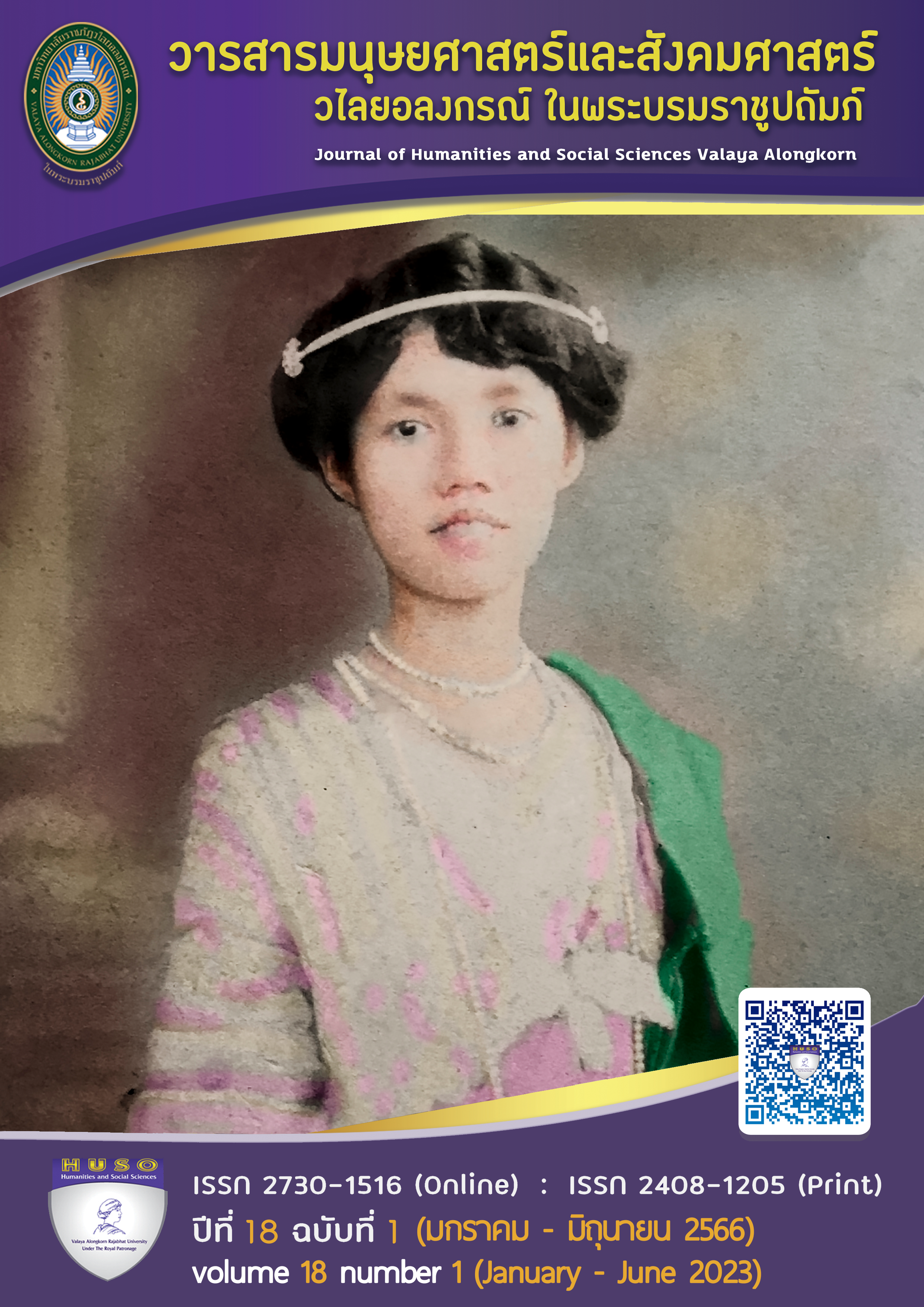DEVELOPMENT OF MOOC-BASED BLENDED LEARNING PROCESS TO ENHANCE CREATIVE THINKING OF ART MAJOR STUDENTS
Main Article Content
Abstract
The objectives of this research were: 1) to develop a MOOC-based blended learning process to enhance creative thinking among art major students, 2) to compare the level of creative thinking after learning with a criterion of 70 percent, and 3) to investigate students' satisfaction with the MOOC-based blended learning process. The sample for this study consisted of 30 students majoring in Fine Arts at ZhouKou Normal University, located in ZhouKou City, Henan Province. The participants were selected using cluster random sampling. The experimental design employed a one-group post-test design. The research instruments included six lesson plans for the MOOC-based blended learning process, a creative thinking test, and a student satisfaction questionnaire. The data analysis involved the following: 1) calculation of the mean and standard deviation (SD) for the post-test creative thinking data, 2) conducting a one-sample t-test on the post-test creative thinking data, and 3) calculation of the mean and standard deviation for the student satisfaction data.
The study yielded the following results. Firstly, the MOOC-based blended learning process consisted of five steps: 1) Learning on MOOC, 2) Creating New Knowledge, 3) Providing Situations for Creative Thinking, 4) Collaborative Creative Thinking, and 5) Exhibiting the Results of Creative Thinking. Secondly, the students' creative thinking improved significantly after engaging in the MOOC-based blended learning process, surpassing the criterion of 70% at a statistical significance level of .05. Lastly, the students' satisfaction with the MOOC-based blended learning process was significantly higher than the criterion of 3.51 at a statistical significance level of .05
Article Details

This work is licensed under a Creative Commons Attribution-NonCommercial-NoDerivatives 4.0 International License.
ลิขสิทธิ์บทความวิจัยที่ได้รับการตีพิมพ์เผยแพร่ในวารสารมนุษยศาสตร์และสังคมศาสตร์ วไลยอลงกรณ์ ในพระบรมราชูปถัมภ์ ถือเป็นกรรมสิทธิ์ของคณะมนุษยศาสตร์และสังคมศาสตร์ มหาวิทยาลัยราชภัฏวไลยอลงกรณ์ ในพระบรมราชูปถัมภ์ ห้ามนำข้อความทั้งหมดหรือบางส่วนไปพิมพ์ซ้ำ เว้นแต่จะได้รับอนุญาตจากมหาวิทยาลัยเป็นลายลักษณ์อักษร
ความรับผิดชอบ เนื้อหาต้นฉบับที่ปรากฏในวารสารมนุษยศาสตร์และสังคมศาสตร์ วไลยอลงกรณ์ ในพระบรมราชูปถัมภ์ เป็นความรับผิดชอบของผู้นิพนธ์บทความหรือผู้เขียนเอง ทั้งนี้ไม่รวมความผิดพลาดอันเกิดจากเทคนิคการพิมพ์
References
Bin He. (2015). SPOC: Teaching process innovation based on MOOC. China Audio-visual Education, (03), 22-29.
Hongchun Z. (2017). Exploration and practice of blended learning mode based on the Blackboard learning platform. Electronic Education Research, (2), 87-98.
Lihua Z. (2006). Research on creative thinking. Educational science, (05), 86-89.
Onchawiang, D. (2021). A study of Massive Open Online Course model for Burapha University project. Journal of Educational Technology and Communications Faculty of Education Mahasarakham University, 4(10), 118-29.
Ongkrutraksa, W. (2021). The use of MOOC in a blended environment of international advertising and marketing communications course. Journal of Rattana Bundit University,
(1), 50-64.
Pachob, S. (2021). The Effect of blended learning in innovation and educational technology courses of students in the Faculty of Education Pitchayabundit College. Academic Journal of Mahamakut Buddhist University Roi Et Campus, 10(1),316-326.
Phakakat, S. (2021). Development of a service-learning model based on a blended learning method to enhance critical thinking for students in higher education. Scholar: Human Sciences, 13(1), 164-175.
Ruangrit, N. (2018). The research and development of instructional design model for Massive Open Online Courses in higher education for educational courses. Veridian
E-Journal, Silpakorn University (Humanities, Social Sciences, and arts), 11(4), 950-961.
Saelo, B. & Boonsawaeng, W. (2021). The study of STEM projects to improve students' creative thinking and beliefs of teachers and students toward STEM projects for improving creative thinking in southern secondary schools. Journal of Education Prince of Songkla University, 32(3), 175-190.
Sirisitthimahachon, K. (2018). Teaching critical thinking in the 21st century learning process towards assessments for development. University of the Thai Chamber of Commerce Journal, 38(3), 106-119.
Sripanlom, T. & Nugultham, K. (2021). Creative thinking ability of undergraduate students in the design of local chemistry products by community-based project learning. Journal of Education Mahasarakham University, 15(1),57-70.
State Council of PRC. (2010). Outline of the National Medium and Long-term Plan for Education Reform and Development.
Theerasopee, N. (2019). Influence factors in the behavioral intention of the use of the web portal Thai MOOC educational System. Silpakorn University Journal, 39(5), 96-116.
Thummanond, C. (2021). The effects of using blended learning program on learning engagement of undergraduate students. Journal of Education Naresuan University, 23(2), 140-151.
Vinitchayajinda, P. (2017). Art projects and creative thinking of elementary school students
in Bangkok. Chulalongkorn Medical Journal, 61(1),117-128.
Yinghong L. (2019). Construction and practical exploration of the blended teaching model
in colleges and universities. Higher Education Exploration, (12), 48-55.


